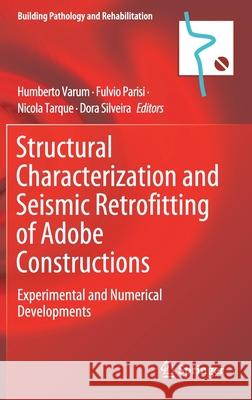Structural Characterization and Seismic Retrofitting of Adobe Constructions: Experimental and Numerical Developments » książka



Structural Characterization and Seismic Retrofitting of Adobe Constructions: Experimental and Numerical Developments
ISBN-13: 9783030747367 / Angielski / Twarda / 2021 / 255 str.
Structural Characterization and Seismic Retrofitting of Adobe Constructions: Experimental and Numerical Developments
ISBN-13: 9783030747367 / Angielski / Twarda / 2021 / 255 str.
(netto: 651,74 VAT: 5%)
Najniższa cena z 30 dni: 655,41
ok. 16-18 dni roboczych.
Darmowa dostawa!
Adobe constructions in the world: What should we know?- Behavior of adobe construction in recent earthquakes.-Mechanical characterization of adobe bricks.- Mechanical characterization of adobe masonry.- Quasi-static testing of adobe masonry walls and structures.- Shaking table testing of adobe masonry walls and structures.- Non-destructive testing tools to support the characterization of adobe constructions.- Seismic strengthening techniques for adobe construction.- Numerical modelling of adobe structures.- Standards and codes for adobe construction.- Conclusions and future research needs.
Humberto Varum is Full Professor at the Civil Engineering Department (Structural Division) of the Faculty of Engineering of the University of Porto, in Portugal. He has privileged the development of his scientific activity mainly in the following areas: assessment, rehabilitation and seismic retrofitting of existing structures; mechanical and structural characterization of earthen constructions; monitoring of the behaviour of structures. He has coordinated and collaborated in many national and international research projects, financed on a competitive basis, and is the author of a large number of publications, including articles in peer-reviewed journals and book chapters. He has edited 4 books, 2 journal special issues and 9 conference proceedings. He is the editor or member of the editorial or scientific committee of 9 international scientific journals and 4 national scientific journals. He has been a member of the scientific committee and an invited speaker of many scientific events and is a member, by election or invitation, of several technical-scientific committees, associations or working groups.
He is Expert Member of the ICOMOS’s International Scientific Committee of Earthen Architectural Heritage (ISCEAH). He is President of the Instituto da Construção of the University of Porto.
Fulvio Parisi is Associate Professor of Structural Engineering at the University of Naples Federico II (Italy) and Associate Researcher of the National Research Council of Italy (CNR). He is Associate Editor of 3 international journals and Editorial Board member of 2 international journals. In almost 20 research projects, his research mainly focused on assessment, retrofitting, robustness, and health monitoring of existing structures. He authored more than 150 papers in peer-reviewed journals and conference proceedings, 1 book, 3 book chapters, 30 reports, and 3 computer tools for seismic analysis of masonry buildings and experimental data selection of masonry properties. He edited 1 book and 2 journal special issues. He was a scientific or organizing committee member of more than 15 international conferences, and coordinator or member of working groups in several associations and standard bodies. His research outcomes were awarded or recognized by several institutions and journals. He is founder of spin-off company FORENSICS, where he is Head of Civil and Risk Engineering services. In 2020, he was included in the list of World’s Top 2% Scientists according to the scientific impact of his research activity.
Nicola Tarque is Full Professor at the Department of Engineering (Civil Engineering Division) of the Pontificia Universidad Católica del Perú (PUCP). He has been involved in projects related to the seismic assessment of reinforced and unreinforced masonry (adobe material, stone, fired brick), and he has been in charge of static and dynamic tests at the Structural Laboratory of the PUCP. His latest researches deal with the displacement-based seismic risk assessment of masonry dwellings, the numerical modelling of historical and vernacular masonry structures, and the evaluation of the expected ground motions at historical sites. His main work field concerns the nonlinear dynamic analysis of structures (masonry, concrete), finite element modelling, seismic design of masonry and reinforced concrete structures, vulnerability assessment of structures, and seismic risk assessment. Recently, he has participated as an invited researcher at the University of Porto (Portugal), University Gabriele d’Annunzio (Italy) and Polytechnical University of Madrid (Spain). Also, he is part of the scientific committee of the Peruvian Earthen Code E-080, member at ISCARSAH (expert membership), and member of other technical-scientific committees and working groups.
Dora Silveira has a degree in Civil Engineering (2006) and a PhD in Civil Engineering (2016) from the University of Aveiro. Her PhD focused on the constructive and mechanical characterization of adobe masonry walls of existing buildings, through building surveys and experimental tests. She is currently a researcher in the project IF MORTAR: experimental and numerical analysis of interface mortar-support, at Itecons - Institute for Research and Technological Development for Construction, Energy, Environment and Sustainability. Previously, she was part of the research team for the following projects: SafEarth: Seismic protection of earthen construction heritage, from 2016 to 2018; Be+Earth: BEhaviour characterization and rehabilitation of EARTHen construction, from 2013 to 2015; Seismic-V: Vernacular seismic culture in Portugal, from 2013 to 2015. She is co-author of 2 book chapters, 9 articles in international journals and 24 articles in international and national conferences. She also co-supervised two master's theses and a doctoral internship. She was a member of the organizing or executive committee of 5 congresses/seminars.
1997-2026 DolnySlask.com Agencja Internetowa
KrainaKsiazek.PL - Księgarnia Internetowa









